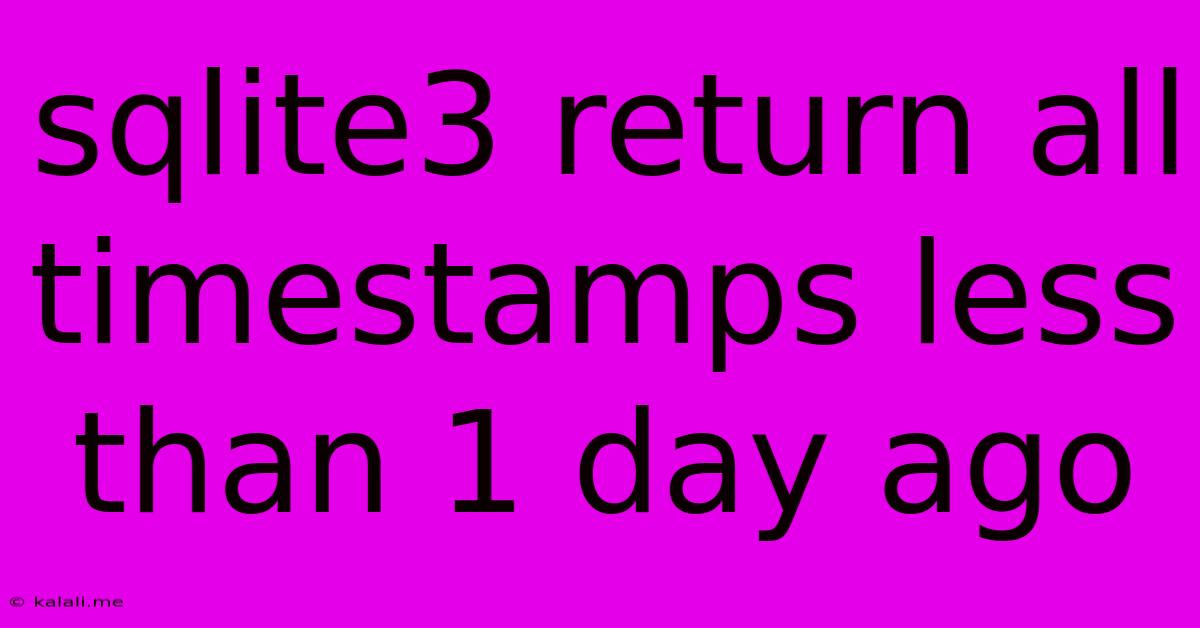Sqlite3 Return All Timestamps Less Than 1 Day Ago
Kalali
May 29, 2025 · 3 min read

Table of Contents
Retrieving Timestamps Less Than 24 Hours Ago in SQLite3
This article provides a comprehensive guide on how to efficiently query your SQLite3 database to retrieve all timestamps that fall within the last 24 hours. We'll explore different approaches, highlight potential pitfalls, and offer best practices for optimal performance. Understanding this is crucial for real-time data analysis and applications requiring up-to-the-minute information.
Understanding the Challenge: SQLite3 doesn't have a dedicated "less than one day ago" function. We need to leverage date and time functions to calculate the cutoff point and compare it against our timestamps.
Method 1: Using STRFTIME and DATETIME
This method utilizes SQLite's built-in STRFTIME function to format the current date and time, and then compares it to your timestamp column.
SELECT *
FROM your_table
WHERE your_timestamp_column >= STRFTIME('%Y-%m-%d %H:%M:%S', DATETIME('now', '-1 day'));
your_table: Replace with the actual name of your table.your_timestamp_column: Replace with the name of your column containing the timestamps. Ensure this column is of a suitable datetime or timestamp data type.DATETIME('now', '-1 day'): This calculates the datetime 24 hours ago from the current time.STRFTIME('%Y-%m-%d %H:%M:%S', ...): This formats the calculated datetime into a string that matches the format of your timestamp column. Adjust the format string if your timestamps are stored differently.
Important Considerations:
- Data Type: Confirm your timestamp column's data type is correctly defined as
TEXT(with a consistent format),INTEGER(representing Unix timestamps), or a dedicatedDATETIMEtype (if supported by your SQLite version). Mismatched data types will lead to incorrect results. - Time Zone:
DATETIME('now', ...)is affected by the system's time zone setting. Consider this if your timestamps are stored in a different time zone. For greater precision, investigate using UTC timestamps. - Index: Creating an index on your timestamp column (
CREATE INDEX idx_timestamp ON your_table (your_timestamp_column);) significantly improves query performance, especially on large datasets.
Method 2: Using Unix Timestamps (INTEGER)
If your timestamps are stored as Unix timestamps (seconds since the epoch), the calculation becomes simpler:
SELECT *
FROM your_table
WHERE your_timestamp_column >= STRFTIME('%s', 'now') - 86400;
86400: Represents the number of seconds in a day (24 hours * 60 minutes * 60 seconds).
This method is generally more efficient than Method 1 as it avoids string comparisons.
Method 3: Handling potential NULL values
If your timestamp column might contain NULL values, add a check to avoid errors:
SELECT *
FROM your_table
WHERE your_timestamp_column >= STRFTIME('%s', 'now') - 86400 AND your_timestamp_column IS NOT NULL;
Choosing the Right Method:
- Method 2 (Unix Timestamps) is generally preferred for its speed and simplicity if you're using Unix timestamps.
- Method 1 (
STRFTIMEandDATETIME) is more flexible and handles various timestamp formats but might be slightly slower.
Remember to replace placeholders like your_table and your_timestamp_column with your actual table and column names. Thoroughly test your chosen method to ensure accuracy and performance in your specific context. Proper indexing is crucial for efficient retrieval of large datasets. Always optimize your queries for the best results.
Latest Posts
Latest Posts
-
Metal Usd In Wiring Over Long Distances
May 31, 2025
-
Does The Camera Add 10 Pounds
May 31, 2025
-
Garage Door Opener Will Not Work With Remote
May 31, 2025
-
Brown Spider With White Dots On Back
May 31, 2025
-
Check Skin Have In An Account Lol
May 31, 2025
Related Post
Thank you for visiting our website which covers about Sqlite3 Return All Timestamps Less Than 1 Day Ago . We hope the information provided has been useful to you. Feel free to contact us if you have any questions or need further assistance. See you next time and don't miss to bookmark.